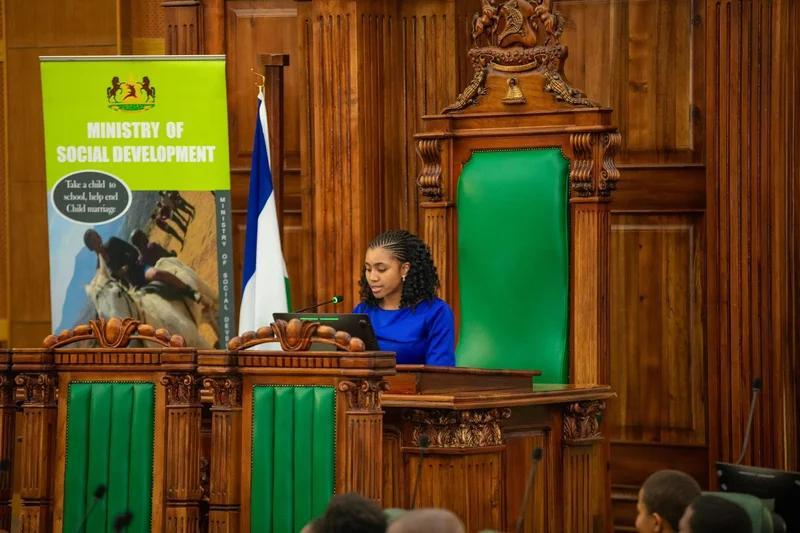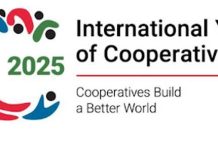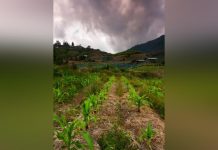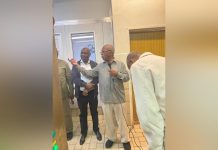Africa-Press – Lesotho. Children from across Lesotho gathered in Maseru this past week for the 2025 National Children’s Parliament, an inspiring event created to give young Basotho a platform to speak out on the issues that matter most to them.
Organised by World Vision Lesotho, in partnership with the Government of Lesotho and UNICEF, this year’s Parliament focused on the theme: “Planning and budgeting of children’s rights progress since 2010.”
The event empowered children to reflect on how far the country has come in upholding their rights and how far it still has to go.
Young participants debated key topics affecting their lives, including education, child protection, mental health, climate change, and inclusive participation. More than just a symbolic gathering, the Parliament served as a space for real dialogue, where children could question policymakers, propose solutions, and submit a Children’s Manifesto.
The National Children’s Parliament is an annual initiative that gives children the rare chance to sit in the seats of legislators engaging in formal debates, asking critical questions, and presenting petitions. It ensures that children are not just heard, but are meaningfully involved in shaping the nation’s future.
“A Platform to Amplify Their Voices”
Mr. James Chifwelu, National Director of World Vision Lesotho, in his remarks, said that the children are already seated in the right place where they can contribute to the decisions that involve them.
Chifwelu further noted that the children’s voices are very effective, adding that it is very good they get to represent their constituencies since they live there.
“World Vision is committed to continue working with the government of Lesotho and key partners such as UNICEF to further the work of the children and give them a platform where they freely express themselves.”
UN Resident Coordinator in Lesotho, Amanda Khozi Mukwashi, praised the initiative, saying it nurtures civic responsibility at an early age.
Mukwashi emphasized, “The 2025 National Children’s Parliament will be used as a platform where they will amplify the voices of the youth, to reflect on what they see in their communities, and the things that they would like to change.”
She pointed out that Africa still faces significant challenges: “Africa’s goals, especially mitigation of poverty, development of human capital and economic growth have not yet been recognised.”
Mukwashi also highlighted the long-term impact of inadequate healthcare, noting. “It is very important to understand that a child born in Lesotho today will only be 40% productive as they could be if they had full access to the right health care, as compared to those born in other countries.” She urged greater investment in health, nutrition, and education.
“The children gathered here today are the future leaders of Lesotho. We must listen to them, respect their views, and act upon their recommendations. This is not just a symbolic event this is governance in action.”
Her Royal Highness Princess Senate Mohato Seeiso encouraged the youth to use this opportunity to share their ideas, dreams, and concerns. She said the Parliament has driven real progress since its start in 2010.
“There have been policies and programs designed to protect their rights to education, health and access to justice and safety,” said H.E Princess Senate.
However, she acknowledged that “despite the strides made, there is still more to be done, in ensuring that every child is given a chance to thrive.”
Among the most discussed topics was education. Children voiced concerns about long distances to schools, poor infrastructure, a lack of teaching materials, and high dropout rates.
They also spoke about limited healthcare access, especially for girls affected by early pregnancy and child marriage.
“Children suffer abuse, lack of access to food and care,” shared Motete from Butha-Buthe. “It seems as though the government prioritises urban areas only, noting that there is also lack of care for children living with disabilities.”
“The government should invest in education systems.”
Mental health emerged as a major issue, with children expressing the emotional strain they face both at school and at home. Many called for school-based counselors and more mental health awareness programs.
“Give books to students, disabled children should be admitted to any school they want, and build computer labs,” said Kefuoe Ramatekoa.
At the end of the session, the young participants presented a Children’s Manifesto, calling for, establishment of child help centers in every district, increased investment in school infrastructure, free sanitary products for girls in schools, creation of a national child mental health program ad inclusion of climate education and formation of environmental clubs in schools
For More News And Analysis About Lesotho Follow Africa-Press






